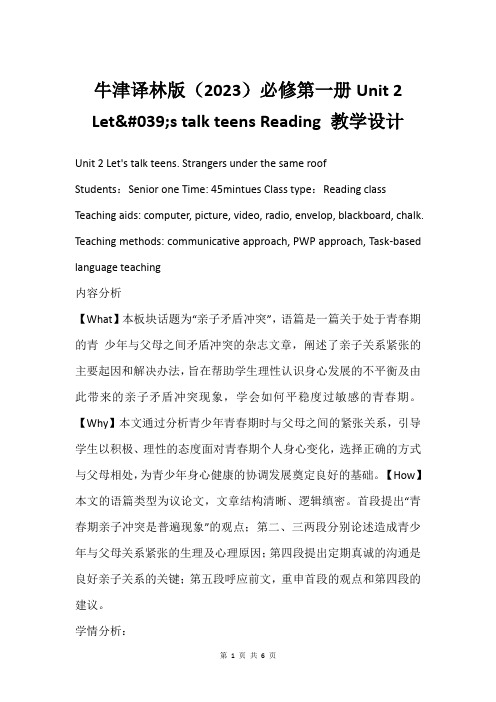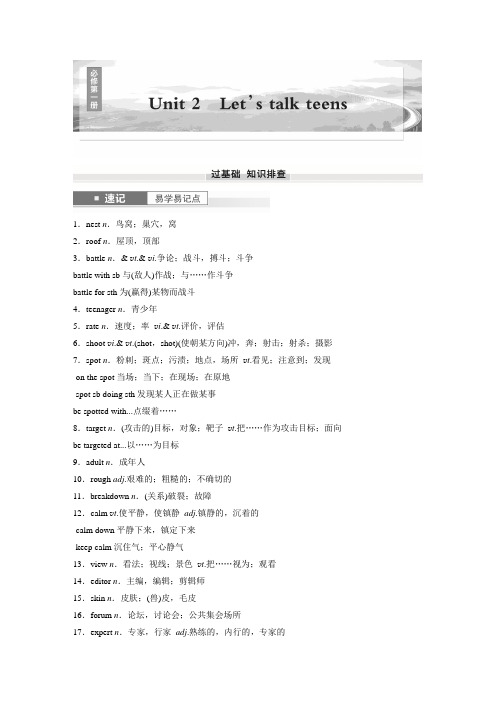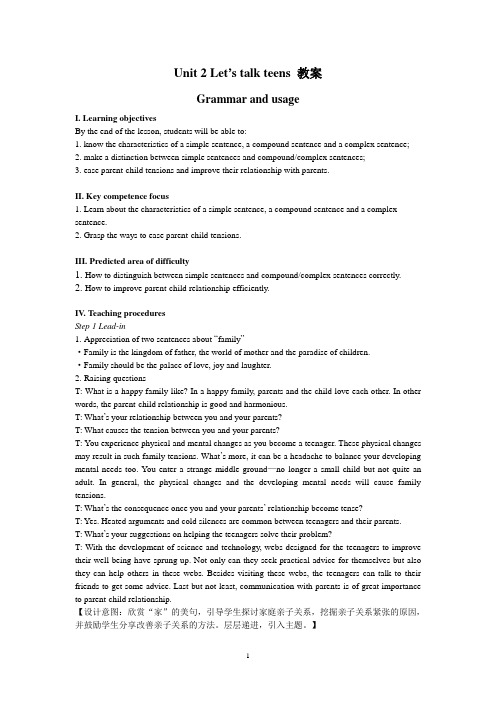译林牛津版新教材高中英语必修第一册UNIT2 Let’s talk teens(Section A B C D)精品课件
译林牛津版新教材高中英语必修第一册UNIT2 Let’s talk teens(Section A

(5)This program was set up with the intention of providing help for homeless people.
高中英语 必修第一册 UNIT 2 Let’s talk teens
a
difference in
improving the situation. The key to it is a peace and calm talk. When you disagree with your parents,
slow down and then explain your 7 actions (act) and feelings 8 calmly (calm),listen carefully
A. Your parents’ love and support.
B. They cannot let you go out.
C. You feel more responsible.
D. Your parents cannot let you make decisions on your own.
__________(they)
causes. You are often worried about your developing rate,2 shooting (shoot)
their
up in height or getting left far behind. Besides,you complain your parents’ incomprehension(不理解).
牛津译林版(2023)必修第一册Unit 2 Let's talk teens Readi

牛津译林版(2023)必修第一册Unit 2 Let's talk teens Reading 教学设计Unit 2 Let's talk teens. Strangers under the same roofStudents:Senior one Time: 45mintues Class type:Reading class Teaching aids: computer, picture, video, radio, envelop, blackboard, chalk. Teaching methods: communicative approach, PWP approach, Task-based language teaching内容分析【What】本板块话题为“亲子矛盾冲突”,语篇是一篇关于处于青春期的青少年与父母之间矛盾冲突的杂志文章,阐述了亲子关系紧张的主要起因和解决办法,旨在帮助学生理性认识身心发展的不平衡及由此带来的亲子矛盾冲突现象,学会如何平稳度过敏感的青春期。
【Why】本文通过分析青少年青春期时与父母之间的紧张关系,引导学生以积极、理性的态度面对青春期个人身心变化,选择正确的方式与父母相处,为青少年身心健康的协调发展奠定良好的基础。
【How】本文的语篇类型为议论文,文章结构清晰、逻辑缜密。
首段提出“青春期亲子冲突是普遍现象”的观点;第二、三两段分别论述造成青少年与父母关系紧张的生理及心理原因;第四段提出定期真诚的沟通是良好亲子关系的关键;第五段呼应前文,重申首段的观点和第四段的建议。
学情分析:1. 学生为高一年级,掌握了对简短英语文章阅读的能力,但是高中英语阅读文章较长,为了做好初中和高中阶段的衔接,应该降低问题设计难度,让学生能够跟上课堂教学环节。
2.在第一单元中学生已经掌握了如何找到文章段落的主旨句,在本节课中可以进行巩固训练,并且进一步培养学生的段落概括能力和议论文结构分析能力。
(译林版):必修第一册 Unit 2 Let’s talk teens(学生版)

1.nest n.鸟窝;巢穴,窝2.roof n.屋顶,顶部3.battle n.& v t.& v i.争论;战斗,搏斗;斗争battle with sb与(敌人)作战;与……作斗争battle for sth为(赢得)某物而战斗4.teenager n.青少年5.rate n.速度;率v i.& v t.评价,评估6.shoot v i.& v t.(shot,shot)(使朝某方向)冲,奔;射击;射杀;摄影7.spot n.粉刺;斑点;污渍;地点,场所v t.看见;注意到;发现·on the spot当场;当下;在现场;在原地·spot sb doing sth发现某人正在做某事be spotted with...点缀着……8.target n.(攻击的)目标,对象;靶子v t.把……作为攻击目标;面向be targeted at...以……为目标9.adult n.成年人10.rough adj.艰难的;粗糙的;不确切的11.breakdown n.(关系)破裂;故障12.calm v t.使平静,使镇静adj.镇静的,沉着的·calm down平静下来,镇定下来·keep calm沉住气;平心静气13.view n.看法;视线;景色v t.把……视为;观看14.editor n.主编,编辑;剪辑师15.skin n.皮肤;(兽)皮,毛皮16.forum n.论坛,讨论会;公共集会场所17.expert n.专家,行家adj.熟练的,内行的,专家的18.unique adj.独一无二的;独特的;独具的,特有的be unique to...是……独有的19.passive adj.消极的,被动的20.youth n.青年时期;青春;(the youth)年轻人21.adventure n.冒险,冒险经历,奇遇22.kangaroo n.袋鼠23.flexible adj.灵活的,可变动的;柔韧的24.rent n.租金v i.& v t.租用;出租25.grocery n.食品杂货;食品杂货店26.gather v i.聚集,集合v t.收拢;搜集,收集;聚集27.emergency n.突发事件,紧急情况28.pipe n.烟斗;管子;管乐器29.downtown ad v.在市中心,往市中心30.operation n.手术;运转,操作31.lap n.大腿部32.teller n.出纳员;叙述者33.scene n.(戏剧等)场;场面,片段;地点,现场;景象,风光34.flat n.公寓adj.平坦的;瘪了的35.tension n.紧张关系;紧张;拉伸→tense adj.紧张的36.anger n.怒气,怒火→angry adj.生气的,愤怒的·boil with anger怒火中烧·be angry at/about/over sth对某事感到生气/愤怒37.mental adj.思想的,精神的,智力的→mentally ad v.精神上;智力上38.regular adj.频繁的;有规律的→regularly ad v.定期地;有规律地39.normal adj.正常的,一般的n.常态,通常标准→normally ad v.通常;正常地→abnormal adj.不正常的,异常的;畸形的40.stress n.精神压力,紧张;强调v t.强调,着重→stressed adj.焦虑不安的→stressful adj.产生压力的;紧张的·under stress在压力之下put/lay/place stress on sth强调某事物·stress the importance of...强调……的重要性41.performance n.表现;表演;执行,履行→perform v t.& v i.表演;表现→performer n.表演者;演员42.press v t.& v i.催促,逼迫;按,压;挤,推n.报章杂志,报刊;(the press)新闻工作者,新闻界→pressure n.心理压力,紧张;压力;要求,催促·press sb to do sth催促某人做某事press sb for sth因某事催促某人·under pressure在压力之下put pressure on sb给某人施压43.secure adj.安心的;可靠的;牢固的v t.获得,得到;保卫→security n.安全44.graduate v i.& v t.毕业n.毕业生→graduation n.毕业graduate from...从……毕业;毕业于……(学校)graduate in...毕业于……(专业)45.volunteer v i.& v t.主动建议(或告诉);自愿做,义务做n.志愿者→voluntary adj.志愿的volunteer to do sth自愿做某事46.response n.回复;反应,响应→respond v i.& v t.回答,回应;作出反应,响应·in response to...回应;响应make a response to...对……作出回应·respond to...对……作出反应47.see eye to eye with sb (on sth)(在某事上)与某人看法一致48.shoot up快速长高,蹿个儿49.think sth through充分考虑,全盘考虑,想透50.back down承认错误,认输51.be on sb’s back about sth缠磨,烦扰52.draw sth out of sth提取,支取53.cheer up(使)变得高兴,振奋起来54.On the other hand,when you are struggling to control your feelings,you wish they could be more caring and patient...(wish从句中的虚拟语气)另一方面,当你努力控制自己的情绪时,你又希望父母能够更加体贴,更有耐心……55.The good news is that this stormy period will not last.(that引导表语从句)好消息是这段“暴风骤雨期”不会一直持续下去。
新教材 牛津译林版高中英语必修一 Unit 2 Let’s talk teens 精品教学课件(共159页)

答案:A
2.What does “Strangers under the same roof” refer to?
A.A big family living together.
B.A couple without communication.
C.Strangers living in the same house.
3.Parents should always agree with their children to avoid family
tensions.
4.Teenagers want both independence and their parents’ love and
support.
5.Healthy discussions are necessary to keep the peace between parents
成年人
9.rough adj. 艰难的;粗糙的;不确切的
10.breakdown n. (关系)破裂;故障
11.skin n.
皮肤;(兽)皮,毛皮
Ⅰ
Ⅱ
Ⅲ
12. battle
n.& vt.& vi.争论;战斗,搏斗;斗争
13. argument n.争吵,争论;论点
14. anxious adj.忧虑的,担心的;令人焦虑的;渴望的
But as Bao grows up,he wants to have his own life.He plays out late with his friends,refusing to come home at his curfew(宵禁).He knows that there is a big world out there,but he can’t cut his mother’s apron strings⑥.
新教材牛津译林版必修第一册Unit2 Let’s talk teens 课时练习题及单元测验

UNIT 2 Let’s talk teens课时作业一 ..................................................................................................................... - 1 -课时作业二 ..................................................................................................................... - 7 -课时作业三 ................................................................................................................... - 13 -单元测验综合................................................................................................................ - 19 -课时作业一Ⅰ.单词拼写1.We should pay attention to the teenagers' mental(精神的) health.2.Several editors(主编) walked in and showed us some new magazines.3.Our teacher used to stress(强调) the importance of the handwriting.4.They will help the villagers make the village return to normal(常态).5.The old couple view(把……视为) the boy as their own grandson.6.I don't want to argue(争辩)with you—just do it!7.Unfortunately,the young man was injured in a struggle(搏斗) with the thief.8.After these years,the woman could keep calm(沉着的) in that situation.9.The mother told me about the tension(紧张关系) between her and her son.10.I have a strong desire(渴望) to visit the old castle,whose door is painted red.Ⅱ.阅读理解AParents can cut the chances of their children getting fat simply by keeping them longer at table.Just three minutes extra at a family mealtime could help prevent child obesity.Research found that among poor families,the extra minutes at mealtimes made great improvement of a normal weight for the youth.The factors are likely to be communication and the importance of a scheduled mealtime.Dr.Barbara Fiese said,“Children,whose families have a 20-minute meal over four times a week,weigh less than kids who leave the table after 15 to 17 minutes.Over time,those extra minutes per meal add up and become really powerful.”The researchers studied 200 family mealtimes,testing the effects of factors and mealtime behavior of families with children in primary school.They found thatfamilies,who said that shared mealtimes were an important part of family life and had special meaning for them,were less likely to have an obese child.Similarly,families,who talked more together and interacted more positively during the meal,were more likely to have healthy-weight children.Teaching low-income families how to make the most of family mealtimes was a wise idea.Dr.Fiese said,“This is something we can target and teach.” She added,“It's also important to recognize the increasing differences of families and their sometimes complex living arrangements that may challenge their abilities to plan ahead and arrange a single time to communicate with each other.”Families in poorer US neighborhoods faced a lot of problems,including poor access to healthy food.But even so,regular high quality family mealtimes made a difference to the children's weight.Dr.Fiese said,“Three to four extra minutes per meal will make a healthy weight more possible.”【语篇解读】本文是一篇说明文。
新牛津译林版必修第一册Unit 2 Let's talk teens Grammar and u

Unit 2 Let’s talk teens 教案Grammar and usageI. Learning objectivesBy the end of the lesson, students will be able to:1. know the characteristics of a simple sentence, a compound sentence and a complex sentence;2. make a distinction between simple sentences and compound/complex sentences;3. ease parent-child tensions and improve their relationship with parents.II. Key competence focus1. Learn about the characteristics of a simple sentence, a compound sentence and a complex sentence.2. Grasp the ways to ease parent-child tensions.III. Predicted area of difficulty1. How to distinguish between simple sentences and compound/complex sentences correctly.2. How to improve parent-child relationship efficiently.IV. Teaching proceduresStep 1 Lead-in1.Appreciation of two sentences about “family”·Family is the kingdom of father, the world of mother and the paradise of children.·Family should be the palace of love, joy and laughter.2.Raising questionsT: What is a happy family like? In a happy family, parents and the child love each other. In other words, the parent-child relationship is good and harmonious.T: What’s your relationship between you and your parents?T: What causes the tension between you and your parents?T: You experience physical and mental changes as you become a teenager. These physical changes may result in such family tensions. What’s more, it can be a headache to balance your developing mental needs too. You enter a strange middle ground—no longer a small child but not quite an adult. In general, the physical changes and the developing mental needs will cause family tensions.T: What’s the consequence once you and your parents’ relationship become tense?T: Yes. Heated arguments and cold silences are common between teenagers and their parents.T: What’s your suggestions on helping the teenagers solve their problem?T: With the development of science and technology, webs designed for the teenagers to improve their well-being have sprung up. Not only can they seek practical advice for themselves but also they can help others in these webs. Besides visiting these webs, the teenagers can talk to their friends to get some advice. Last but not least, communication with parents is of great importance to parent-child relationship.【设计意图:欣赏“家”的美句,引导学生探讨家庭亲子关系,挖掘亲子关系紧张的原因,并鼓励学生分享改善亲子关系的方法。
Unit 2 Let’s talk teens Welcome to 牛津译林版高一英语必修第一册
appear, what should you do? 7. How can teenagers have a healthy discussion with their
Global reading Complete the chart in A1 on page 18.
Para. 1
Para. 2
Teenagers' physical growth may result in such family tensions.
Para. 3
Teenagers’ developing mental needs can also influence parent-child relationships.
Para 5: Everything will turn out all right in the end,… ... L36 Conclusion
2. What is the structure of the article? Why? (How many parts can the article be divided into?Why?)
What is the similarity相似点 of the two poems? -- They both praise the uncoSnodnigtoiof nthaelPlaorvtiengoSfopnarents
for their children.A thread in one hand of the loving mother,
What Chinese poems about parents' love for their children can you think of ?
高中英语 牛津译林江苏高一必修第一册Unit2 Let's talk teens词汇精讲
江苏译林版高一必修第一册Unit2词汇讲解(新教材)nest n. 鸟窝,鸟巢,巢穴,窝v. 筑巢,巢居I can see an eagle's nest on the rocks.我能看到岩石上的鹰巢。
Some species may nest in close proximity to each other. 一些鸟类会彼此紧挨着筑巢。
roof n. 屋顶,顶部the roof of... ...的顶部The roof of the car was not damaged in the accident. 事故中,车顶没有遭到损坏。
I am just thankful that we have a roof over our heads. 我们有地方住我就很感激了。
battle n. / v. 争论,战斗,战役,搏斗,争斗A battle is a violent fight between groups of people, especially one between military forces during a war.Thousands of people battled with police and several were repo rtedly wounded数千人与警方发生冲突,据报道有数人在冲突中受伤。
see eye to eye with sb. on sth. (在某事上)与某人看法一致He doesn’t see eye to eye with his brother about this matter. 在这个问题上他和他哥哥看法不一致Mike and his father don’t see eye to e ye on the issue.Mike和他老爸在这个问题上没有达到一致。
keep an eye on...照看,留意keep an eye out for 密切注意argue argument argue v. 争吵,争论,争辩,说理,论证argue with ab about sthWe're always arguing with each other about money. 我们总是为钱吵嘴。
牛津译林 必修第一册 单词分层解析二 Unit 2 Let‘s talk teens
1.argument n.争吵, 争论, 论点, 论据【课文原句】Heated arguments and cold silences are common between teenagers and their parents.青少年和他们的父母之间经常会有激烈的争论和冰冷的沉默。
【常用搭配】①have an argument with sb.about / over sth.为某事与某人争吵②get into an argument 争吵起来③avoid an argument 避免争吵Probably the worst thing about being a penguin is after you’re in an argument you’ll try to waddle away angrily but still look adorably cute.身为企鹅最糟糕的一点也许是, 一场激烈的争吵之后, 你试图摇摆着愤然离开, 而在别人眼中仍是一个小可爱。
【联想词】argue v.争论, 争吵, 论证, 争辩argue with sb.与某人争辩argue about / over sth.为某事争论➢argue against / for (doing)sth.争辩反对/ 据理力争(做)某事What do you usually argue about with your parents? 你通常因为什么和你的父母争吵呢?2.anxious adj.忧虑的, 担忧的, 令人焦虑的, 渴望的【课文原句】You may feel anxious that you are developing at a different rate to your friends, shooting up in height or getting left far behind.你可能会感到焦虑,因为你的成长速度与你的朋友不同,你的身高在猛增,或者远远落后(于你的朋友).【常用搭配】①be anxious about sth.担心某事②be anxious for sb.为某人担心③be anxious for sth.渴望得到某物④be anxious (for sb.) to do sth.渴望(某人)做某事⑤be anxious that…忧虑/ 渴望➢We are anxious about his safety.我们担心他的安全。
新教材 高中英语 必修第一册 译林牛津版 UNIT 2 integreted skill
as if they had heard nothing(好像他
教材原句p.22 When I do go out,they always ask,“Where are you going? ”当我真要
出去时,他们总是问:“你要去哪里?”
【句式分析】此句为强调句。需要强调谓语时,用“助动词 do/does/ did + 动词原形”。
(2)The government needs a
more flexible approach
(更灵活的方法)to education.
单句语法填空
(3)His poor method of learning by rote made him unable to deal with the problems in his work
选择在空闲时间做什么了。
4 flexible adj. 灵活的,可变动的;柔韧的
a flexible schedule 灵活的时间安排
搭配 a more flexible approach 更灵活的方法
a flexible body 柔韧的身体
The job appeals to me so much. This is because the working hours are very flexible.
这份工作对我有很大的吸引力,这是因为工作时间很灵活。
【词语积累】
完成句子
(1)Mothers holding jobs outside the home should
have flexible schedules
( 有灵活的时间安
排)to make it easier to care for their children.
